In-House Attorney Resume Examples

Jul 18, 2024
|
12 min read
Drafting distinctions: create an in-house attorney resume that wins the case for you. In this guide, you'll learn key tips and strategies to turn your skills into a compelling narrative.
Rated by 348 people
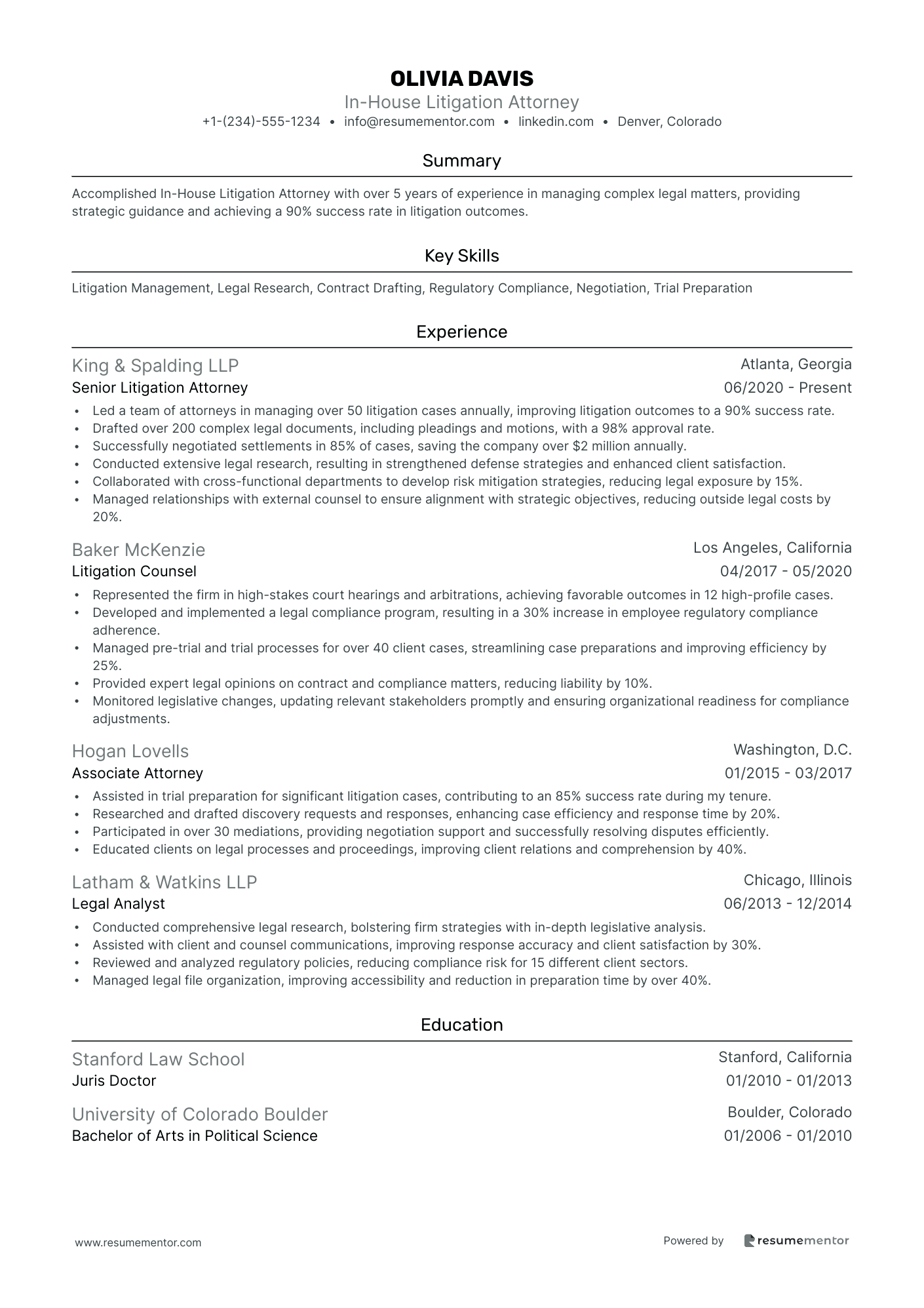
In-House Litigation Attorney
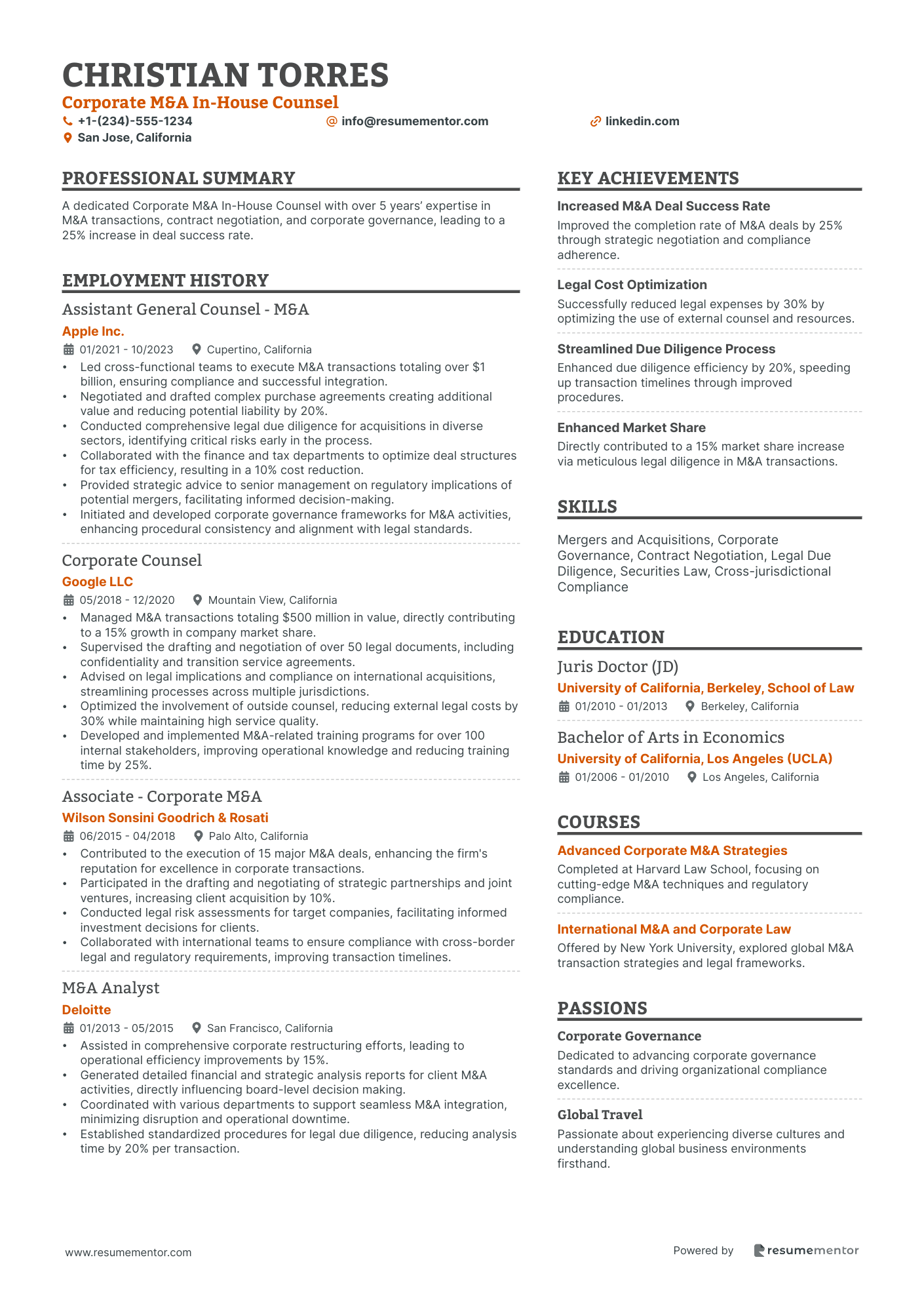
Corporate M&A In-House Counsel
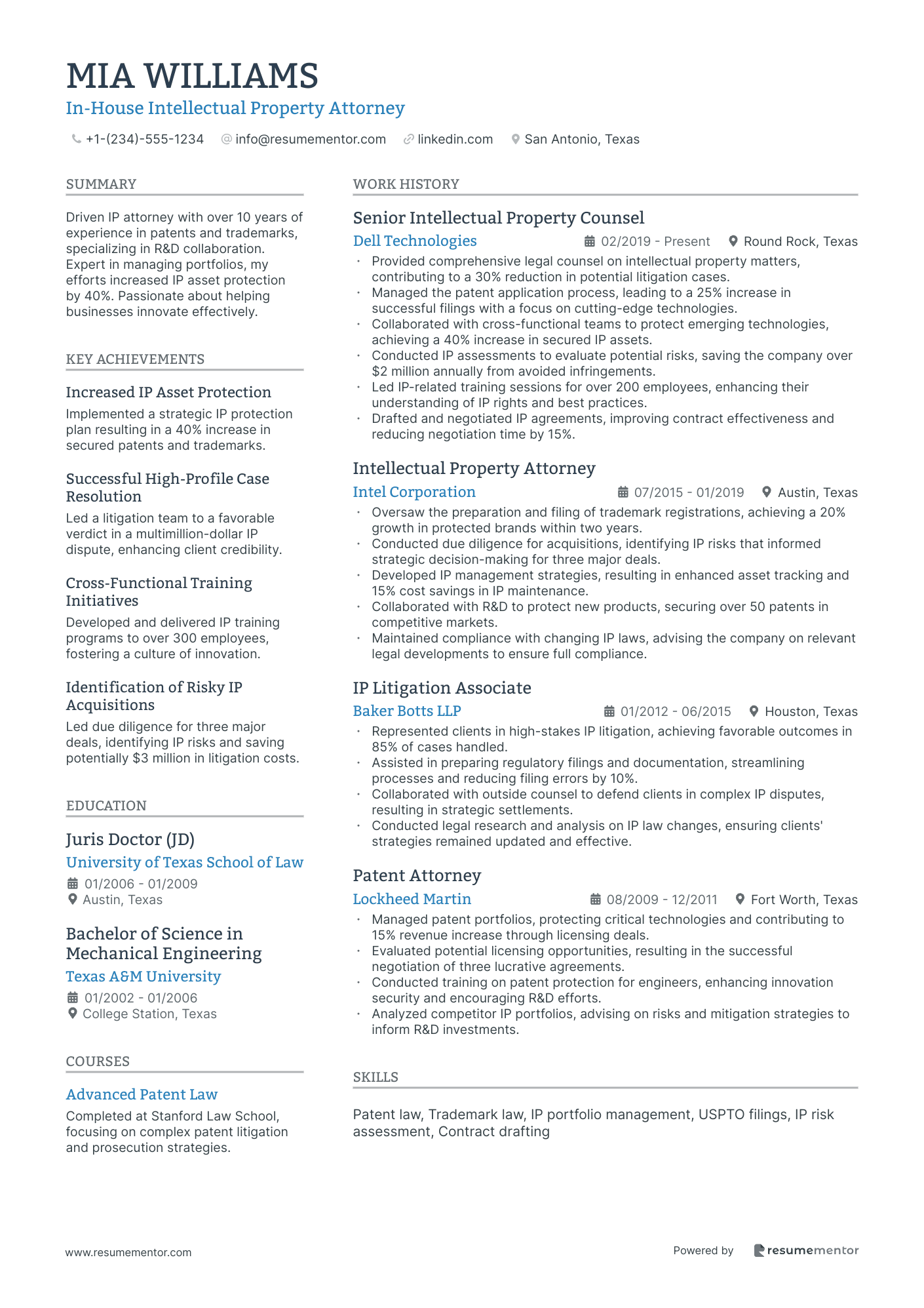
In-House Intellectual Property Attorney
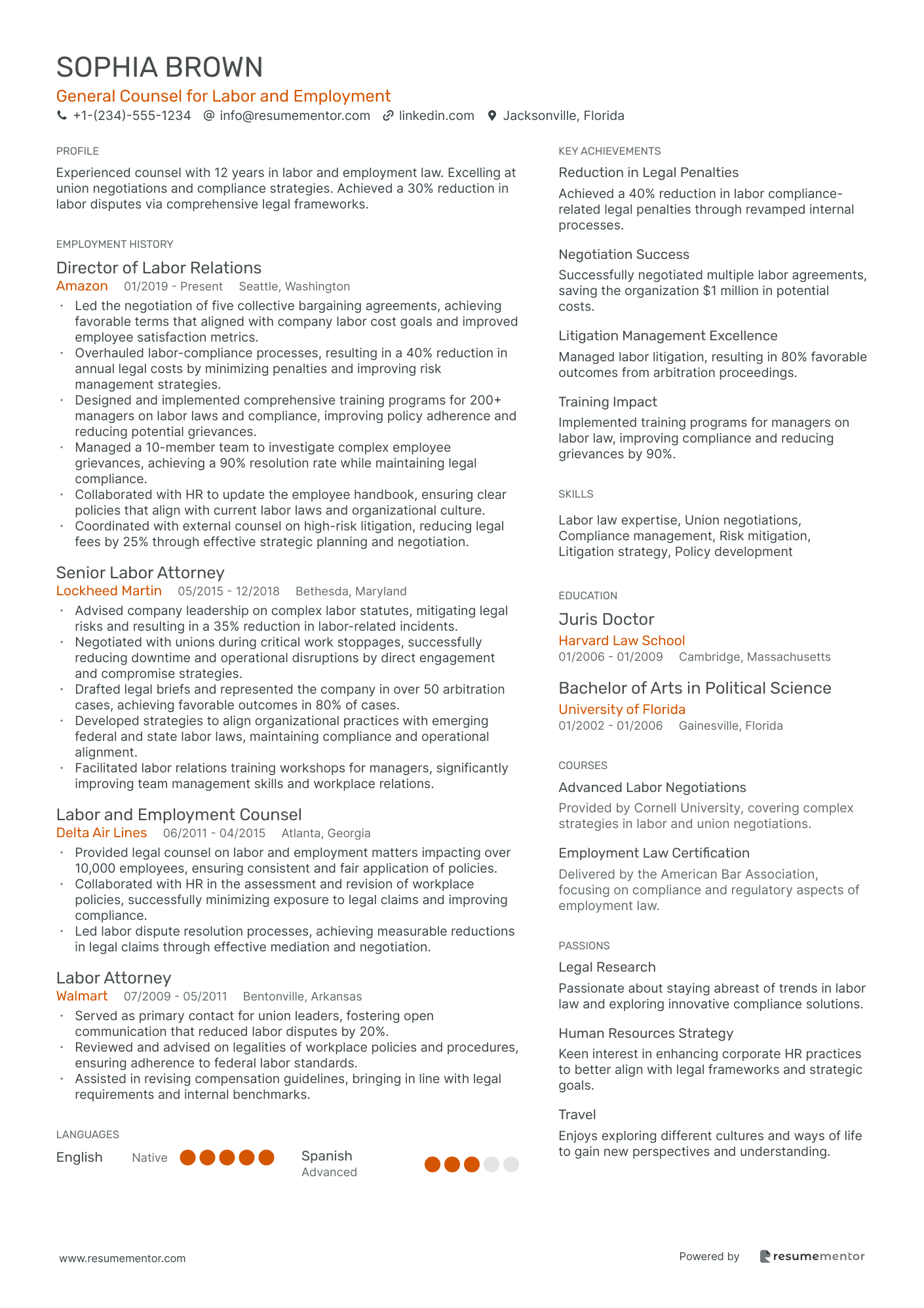
General Counsel for Labor and Employment
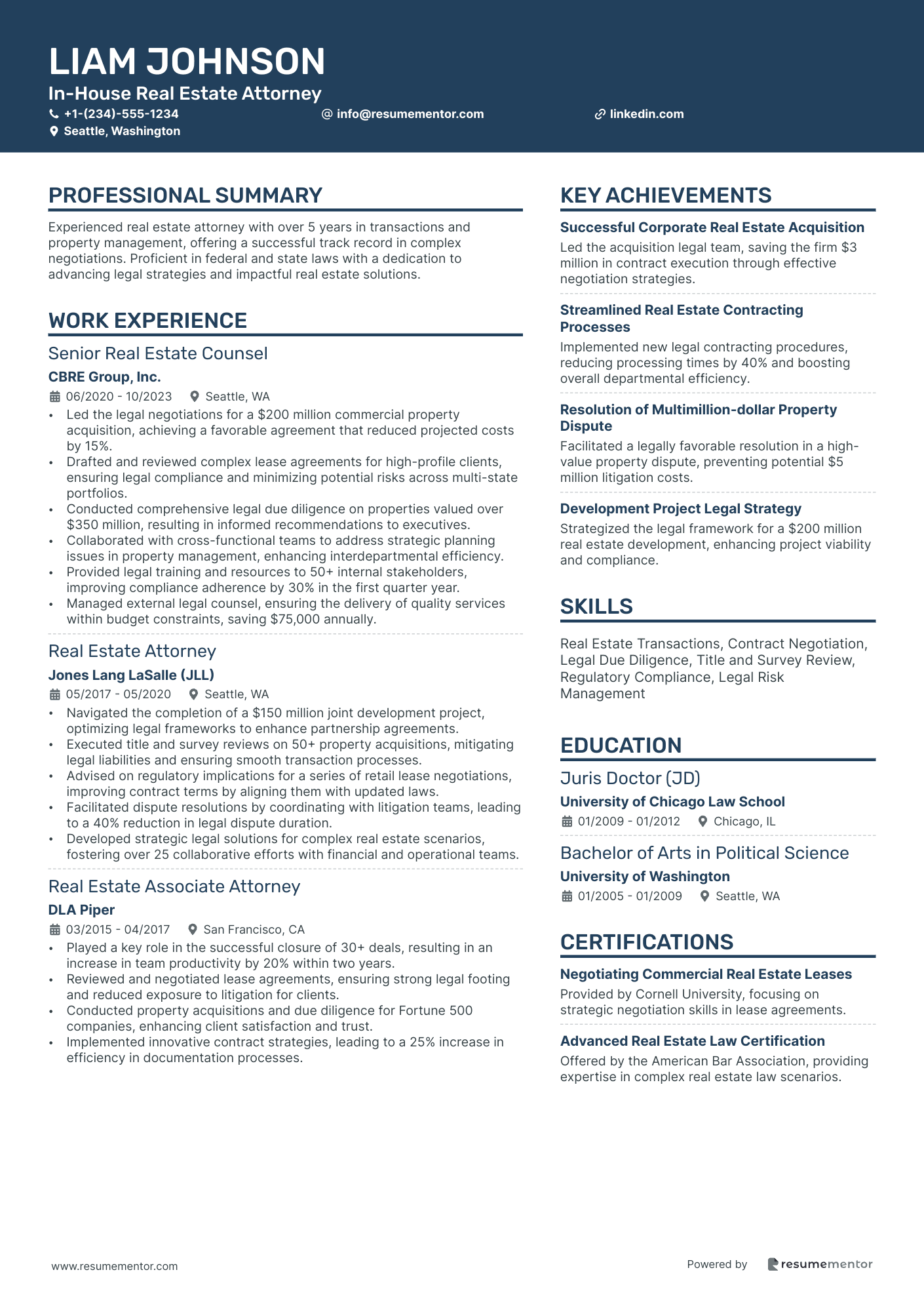
In-House Real Estate Attorney
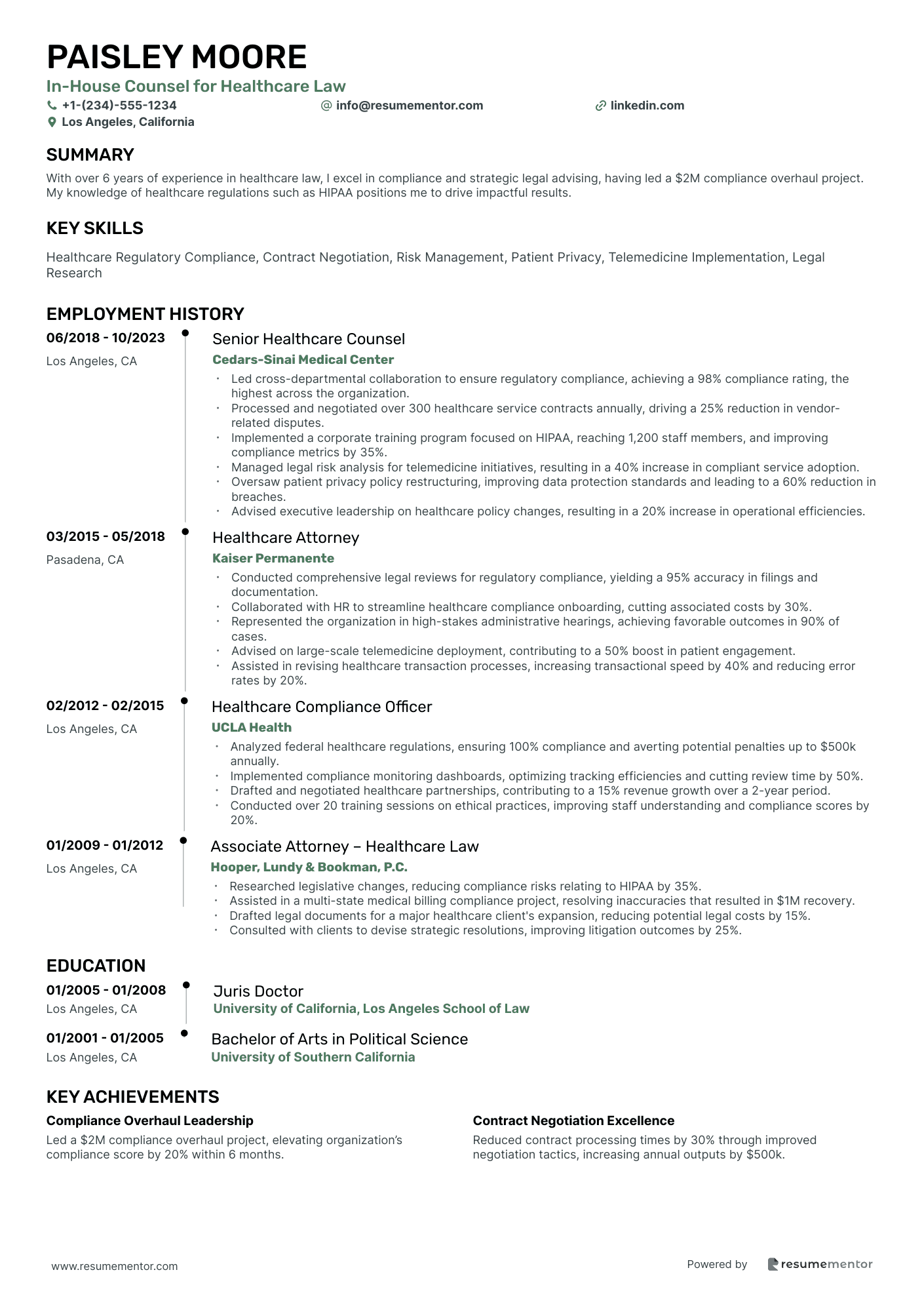
In-House Counsel for Healthcare Law
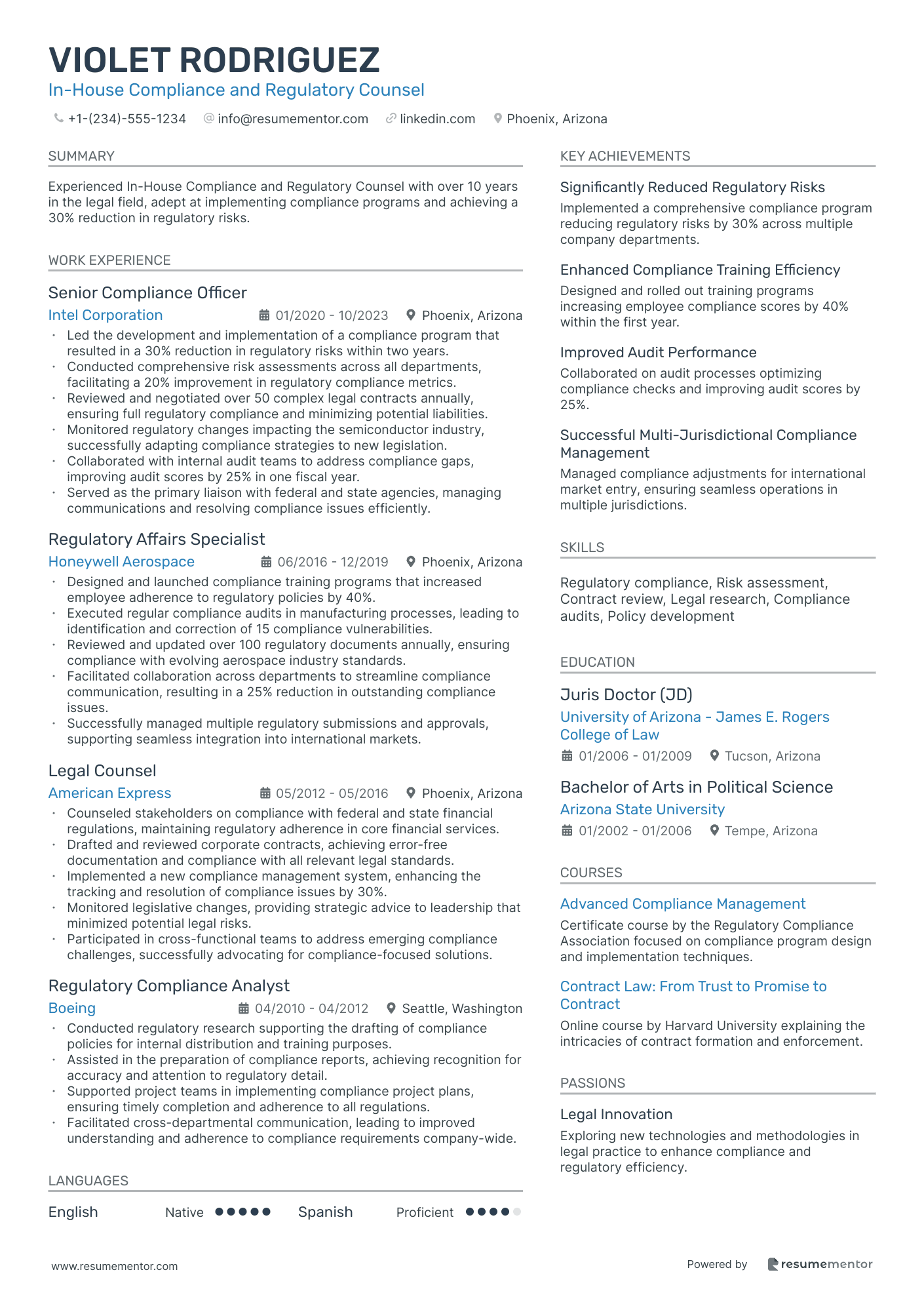
In-House Compliance and Regulatory Counsel
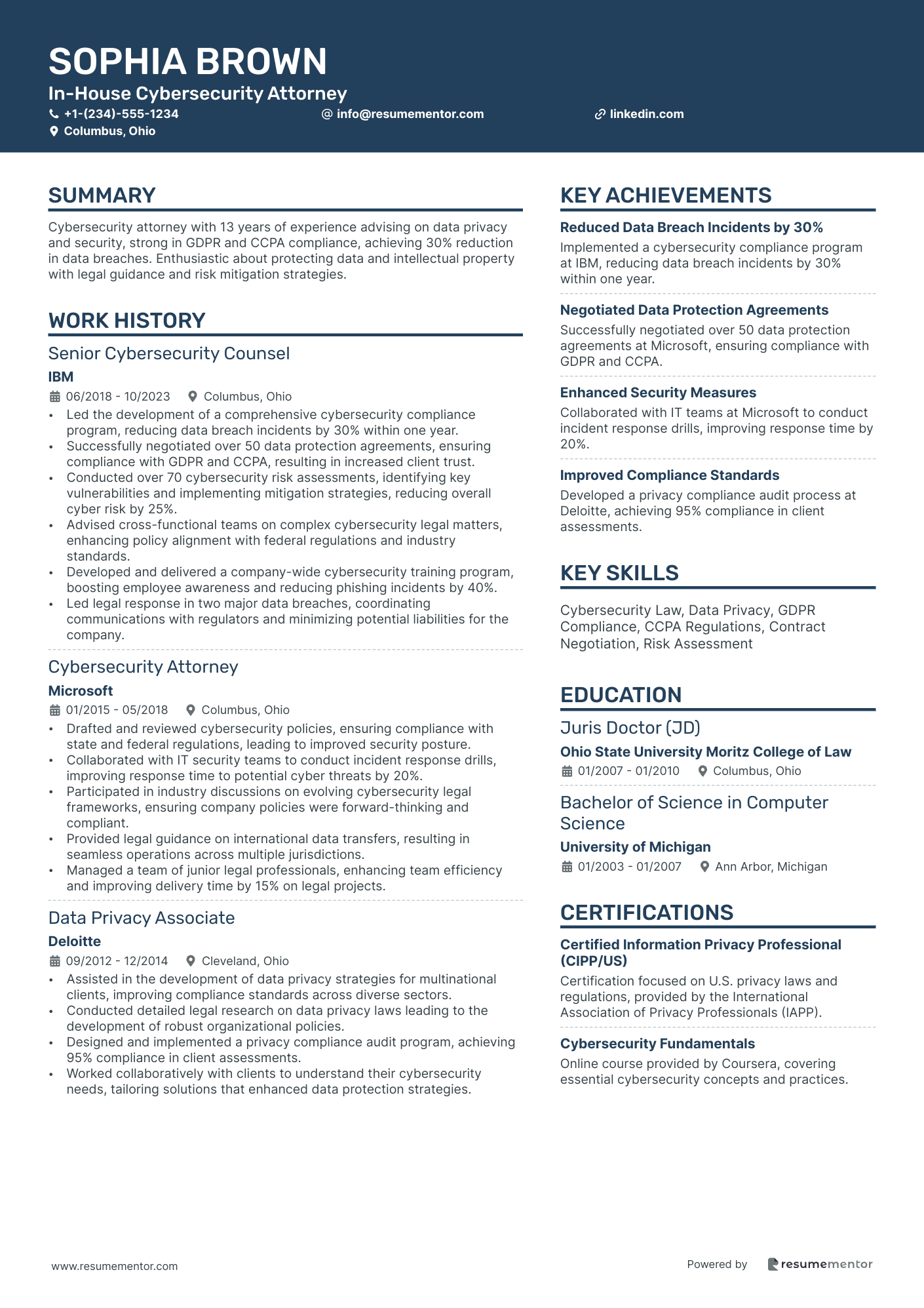
In-House Cybersecurity Attorney
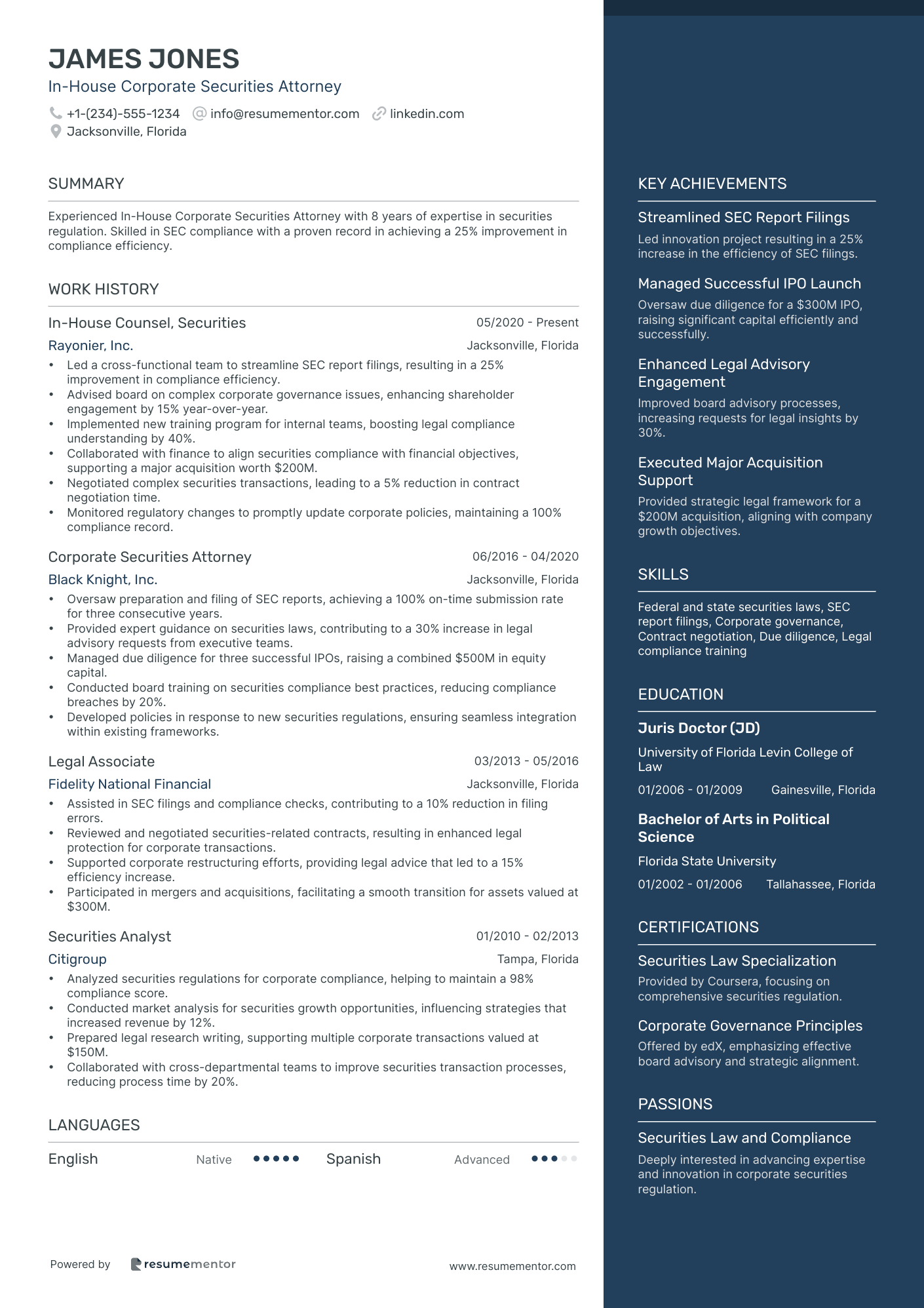
In-House Corporate Securities Attorney
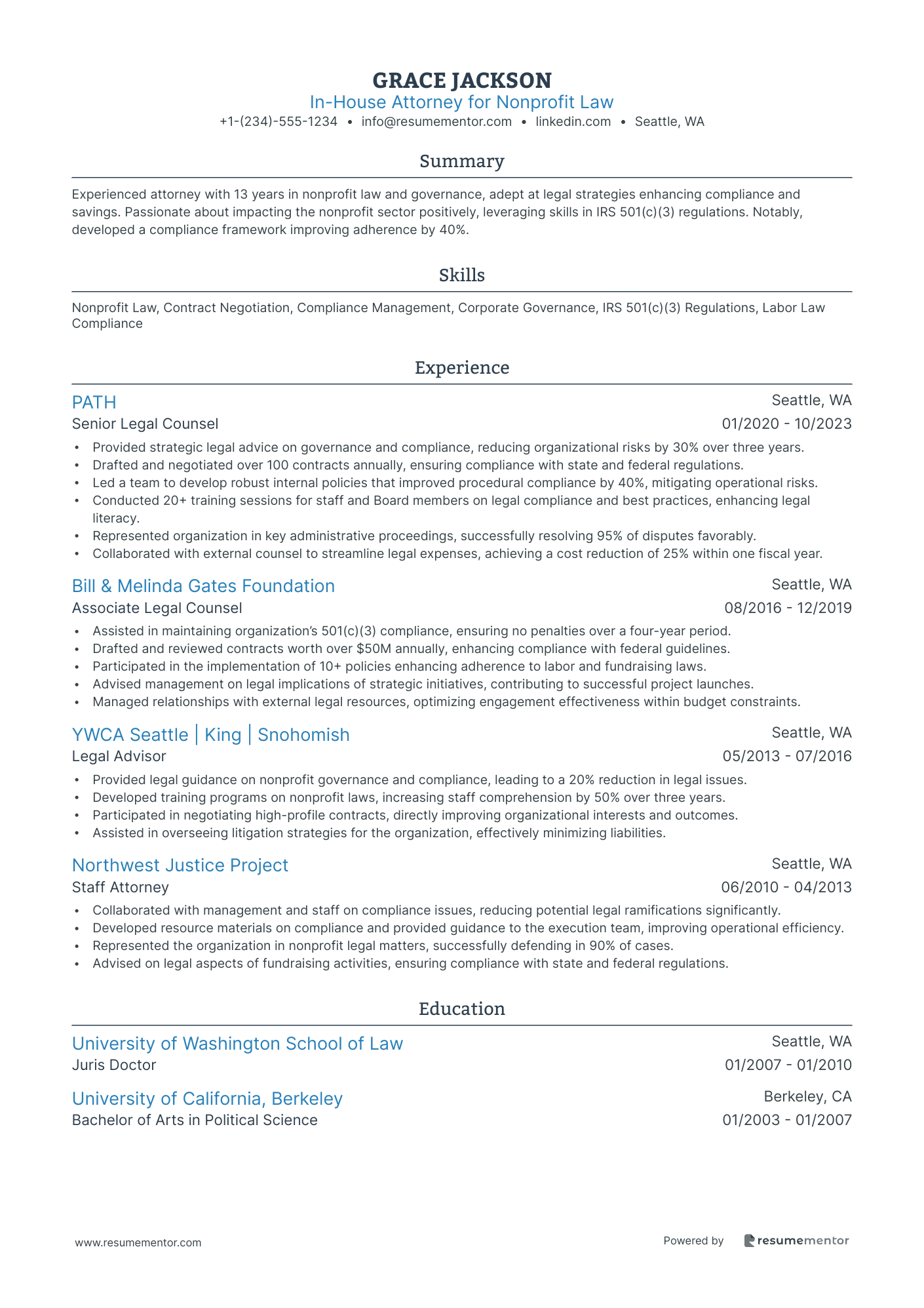
In-House Attorney for Nonprofit Law

In-House Litigation Attorney resume sample
- •Led a team of attorneys in managing over 50 litigation cases annually, improving litigation outcomes to a 90% success rate.
- •Drafted over 200 complex legal documents, including pleadings and motions, with a 98% approval rate.
- •Successfully negotiated settlements in 85% of cases, saving the company over $2 million annually.
- •Conducted extensive legal research, resulting in strengthened defense strategies and enhanced client satisfaction.
- •Collaborated with cross-functional departments to develop risk mitigation strategies, reducing legal exposure by 15%.
- •Managed relationships with external counsel to ensure alignment with strategic objectives, reducing outside legal costs by 20%.
- •Represented the firm in high-stakes court hearings and arbitrations, achieving favorable outcomes in 12 high-profile cases.
- •Developed and implemented a legal compliance program, resulting in a 30% increase in employee regulatory compliance adherence.
- •Managed pre-trial and trial processes for over 40 client cases, streamlining case preparations and improving efficiency by 25%.
- •Provided expert legal opinions on contract and compliance matters, reducing liability by 10%.
- •Monitored legislative changes, updating relevant stakeholders promptly and ensuring organizational readiness for compliance adjustments.
- •Assisted in trial preparation for significant litigation cases, contributing to an 85% success rate during my tenure.
- •Researched and drafted discovery requests and responses, enhancing case efficiency and response time by 20%.
- •Participated in over 30 mediations, providing negotiation support and successfully resolving disputes efficiently.
- •Educated clients on legal processes and proceedings, improving client relations and comprehension by 40%.
- •Conducted comprehensive legal research, bolstering firm strategies with in-depth legislative analysis.
- •Assisted with client and counsel communications, improving response accuracy and client satisfaction by 30%.
- •Reviewed and analyzed regulatory policies, reducing compliance risk for 15 different client sectors.
- •Managed legal file organization, improving accessibility and reduction in preparation time by over 40%.
Corporate M&A In-House Counsel resume sample
- •Led cross-functional teams to execute M&A transactions totaling over $1 billion, ensuring compliance and successful integration.
- •Negotiated and drafted complex purchase agreements creating additional value and reducing potential liability by 20%.
- •Conducted comprehensive legal due diligence for acquisitions in diverse sectors, identifying critical risks early in the process.
- •Collaborated with the finance and tax departments to optimize deal structures for tax efficiency, resulting in a 10% cost reduction.
- •Provided strategic advice to senior management on regulatory implications of potential mergers, facilitating informed decision-making.
- •Initiated and developed corporate governance frameworks for M&A activities, enhancing procedural consistency and alignment with legal standards.
- •Managed M&A transactions totaling $500 million in value, directly contributing to a 15% growth in company market share.
- •Supervised the drafting and negotiation of over 50 legal documents, including confidentiality and transition service agreements.
- •Advised on legal implications and compliance on international acquisitions, streamlining processes across multiple jurisdictions.
- •Optimized the involvement of outside counsel, reducing external legal costs by 30% while maintaining high service quality.
- •Developed and implemented M&A-related training programs for over 100 internal stakeholders, improving operational knowledge and reducing training time by 25%.
- •Contributed to the execution of 15 major M&A deals, enhancing the firm's reputation for excellence in corporate transactions.
- •Participated in the drafting and negotiating of strategic partnerships and joint ventures, increasing client acquisition by 10%.
- •Conducted legal risk assessments for target companies, facilitating informed investment decisions for clients.
- •Collaborated with international teams to ensure compliance with cross-border legal and regulatory requirements, improving transaction timelines.
- •Assisted in comprehensive corporate restructuring efforts, leading to operational efficiency improvements by 15%.
- •Generated detailed financial and strategic analysis reports for client M&A activities, directly influencing board-level decision making.
- •Coordinated with various departments to support seamless M&A integration, minimizing disruption and operational downtime.
- •Established standardized procedures for legal due diligence, reducing analysis time by 20% per transaction.
In-House Intellectual Property Attorney resume sample
- •Provided comprehensive legal counsel on intellectual property matters, contributing to a 30% reduction in potential litigation cases.
- •Managed the patent application process, leading to a 25% increase in successful filings with a focus on cutting-edge technologies.
- •Collaborated with cross-functional teams to protect emerging technologies, achieving a 40% increase in secured IP assets.
- •Conducted IP assessments to evaluate potential risks, saving the company over $2 million annually from avoided infringements.
- •Led IP-related training sessions for over 200 employees, enhancing their understanding of IP rights and best practices.
- •Drafted and negotiated IP agreements, improving contract effectiveness and reducing negotiation time by 15%.
- •Oversaw the preparation and filing of trademark registrations, achieving a 20% growth in protected brands within two years.
- •Conducted due diligence for acquisitions, identifying IP risks that informed strategic decision-making for three major deals.
- •Developed IP management strategies, resulting in enhanced asset tracking and 15% cost savings in IP maintenance.
- •Collaborated with R&D to protect new products, securing over 50 patents in competitive markets.
- •Maintained compliance with changing IP laws, advising the company on relevant legal developments to ensure full compliance.
- •Represented clients in high-stakes IP litigation, achieving favorable outcomes in 85% of cases handled.
- •Assisted in preparing regulatory filings and documentation, streamlining processes and reducing filing errors by 10%.
- •Collaborated with outside counsel to defend clients in complex IP disputes, resulting in strategic settlements.
- •Conducted legal research and analysis on IP law changes, ensuring clients' strategies remained updated and effective.
- •Managed patent portfolios, protecting critical technologies and contributing to 15% revenue increase through licensing deals.
- •Evaluated potential licensing opportunities, resulting in the successful negotiation of three lucrative agreements.
- •Conducted training on patent protection for engineers, enhancing innovation security and encouraging R&D efforts.
- •Analyzed competitor IP portfolios, advising on risks and mitigation strategies to inform R&D investments.
General Counsel for Labor and Employment resume sample
- •Led the negotiation of five collective bargaining agreements, achieving favorable terms that aligned with company labor cost goals and improved employee satisfaction metrics.
- •Overhauled labor-compliance processes, resulting in a 40% reduction in annual legal costs by minimizing penalties and improving risk management strategies.
- •Designed and implemented comprehensive training programs for 200+ managers on labor laws and compliance, improving policy adherence and reducing potential grievances.
- •Managed a 10-member team to investigate complex employee grievances, achieving a 90% resolution rate while maintaining legal compliance.
- •Collaborated with HR to update the employee handbook, ensuring clear policies that align with current labor laws and organizational culture.
- •Coordinated with external counsel on high-risk litigation, reducing legal fees by 25% through effective strategic planning and negotiation.
- •Advised company leadership on complex labor statutes, mitigating legal risks and resulting in a 35% reduction in labor-related incidents.
- •Negotiated with unions during critical work stoppages, successfully reducing downtime and operational disruptions by direct engagement and compromise strategies.
- •Drafted legal briefs and represented the company in over 50 arbitration cases, achieving favorable outcomes in 80% of cases.
- •Developed strategies to align organizational practices with emerging federal and state labor laws, maintaining compliance and operational alignment.
- •Facilitated labor relations training workshops for managers, significantly improving team management skills and workplace relations.
- •Provided legal counsel on labor and employment matters impacting over 10,000 employees, ensuring consistent and fair application of policies.
- •Collaborated with HR in the assessment and revision of workplace policies, successfully minimizing exposure to legal claims and improving compliance.
- •Led labor dispute resolution processes, achieving measurable reductions in legal claims through effective mediation and negotiation.
- •Served as primary contact for union leaders, fostering open communication that reduced labor disputes by 20%.
- •Reviewed and advised on legalities of workplace policies and procedures, ensuring adherence to federal labor standards.
- •Assisted in revising compensation guidelines, bringing in line with legal requirements and internal benchmarks.
In-House Real Estate Attorney resume sample
- •Led the legal negotiations for a $200 million commercial property acquisition, achieving a favorable agreement that reduced projected costs by 15%.
- •Drafted and reviewed complex lease agreements for high-profile clients, ensuring legal compliance and minimizing potential risks across multi-state portfolios.
- •Conducted comprehensive legal due diligence on properties valued over $350 million, resulting in informed recommendations to executives.
- •Collaborated with cross-functional teams to address strategic planning issues in property management, enhancing interdepartmental efficiency.
- •Provided legal training and resources to 50+ internal stakeholders, improving compliance adherence by 30% in the first quarter year.
- •Managed external legal counsel, ensuring the delivery of quality services within budget constraints, saving $75,000 annually.
- •Navigated the completion of a $150 million joint development project, optimizing legal frameworks to enhance partnership agreements.
- •Executed title and survey reviews on 50+ property acquisitions, mitigating legal liabilities and ensuring smooth transaction processes.
- •Advised on regulatory implications for a series of retail lease negotiations, improving contract terms by aligning them with updated laws.
- •Facilitated dispute resolutions by coordinating with litigation teams, leading to a 40% reduction in legal dispute duration.
- •Developed strategic legal solutions for complex real estate scenarios, fostering over 25 collaborative efforts with financial and operational teams.
- •Played a key role in the successful closure of 30+ deals, resulting in an increase in team productivity by 20% within two years.
- •Reviewed and negotiated lease agreements, ensuring strong legal footing and reduced exposure to litigation for clients.
- •Conducted property acquisitions and due diligence for Fortune 500 companies, enhancing client satisfaction and trust.
- •Implemented innovative contract strategies, leading to a 25% increase in efficiency in documentation processes.
- •Assisted senior attorneys in the management of high-value property transactions, contributing to proactive risk management strategies.
- •Performed extensive legal research, supporting the development of comprehensive legal briefs for intricate property disputes.
- •Facilitated client meetings and provided legal insights, aiding in the clarification of complex real estate issues for decision-making.
- •Contributed to the drafting and revision of purchase and sale agreements, enhancing their precision and legal soundness.
In-House Counsel for Healthcare Law resume sample
- •Led cross-departmental collaboration to ensure regulatory compliance, achieving a 98% compliance rating, the highest across the organization.
- •Processed and negotiated over 300 healthcare service contracts annually, driving a 25% reduction in vendor-related disputes.
- •Implemented a corporate training program focused on HIPAA, reaching 1,200 staff members, and improving compliance metrics by 35%.
- •Managed legal risk analysis for telemedicine initiatives, resulting in a 40% increase in compliant service adoption.
- •Oversaw patient privacy policy restructuring, improving data protection standards and leading to a 60% reduction in breaches.
- •Advised executive leadership on healthcare policy changes, resulting in a 20% increase in operational efficiencies.
- •Conducted comprehensive legal reviews for regulatory compliance, yielding a 95% accuracy in filings and documentation.
- •Collaborated with HR to streamline healthcare compliance onboarding, cutting associated costs by 30%.
- •Represented the organization in high-stakes administrative hearings, achieving favorable outcomes in 90% of cases.
- •Advised on large-scale telemedicine deployment, contributing to a 50% boost in patient engagement.
- •Assisted in revising healthcare transaction processes, increasing transactional speed by 40% and reducing error rates by 20%.
- •Analyzed federal healthcare regulations, ensuring 100% compliance and averting potential penalties up to $500k annually.
- •Implemented compliance monitoring dashboards, optimizing tracking efficiencies and cutting review time by 50%.
- •Drafted and negotiated healthcare partnerships, contributing to a 15% revenue growth over a 2-year period.
- •Conducted over 20 training sessions on ethical practices, improving staff understanding and compliance scores by 20%.
- •Researched legislative changes, reducing compliance risks relating to HIPAA by 35%.
- •Assisted in a multi-state medical billing compliance project, resolving inaccuracies that resulted in $1M recovery.
- •Drafted legal documents for a major healthcare client's expansion, reducing potential legal costs by 15%.
- •Consulted with clients to devise strategic resolutions, improving litigation outcomes by 25%.
In-House Compliance and Regulatory Counsel resume sample
- •Led the development and implementation of a compliance program that resulted in a 30% reduction in regulatory risks within two years.
- •Conducted comprehensive risk assessments across all departments, facilitating a 20% improvement in regulatory compliance metrics.
- •Reviewed and negotiated over 50 complex legal contracts annually, ensuring full regulatory compliance and minimizing potential liabilities.
- •Monitored regulatory changes impacting the semiconductor industry, successfully adapting compliance strategies to new legislation.
- •Collaborated with internal audit teams to address compliance gaps, improving audit scores by 25% in one fiscal year.
- •Served as the primary liaison with federal and state agencies, managing communications and resolving compliance issues efficiently.
- •Designed and launched compliance training programs that increased employee adherence to regulatory policies by 40%.
- •Executed regular compliance audits in manufacturing processes, leading to identification and correction of 15 compliance vulnerabilities.
- •Reviewed and updated over 100 regulatory documents annually, ensuring compliance with evolving aerospace industry standards.
- •Facilitated collaboration across departments to streamline compliance communication, resulting in a 25% reduction in outstanding compliance issues.
- •Successfully managed multiple regulatory submissions and approvals, supporting seamless integration into international markets.
- •Counseled stakeholders on compliance with federal and state financial regulations, maintaining regulatory adherence in core financial services.
- •Drafted and reviewed corporate contracts, achieving error-free documentation and compliance with all relevant legal standards.
- •Implemented a new compliance management system, enhancing the tracking and resolution of compliance issues by 30%.
- •Monitored legislative changes, providing strategic advice to leadership that minimized potential legal risks.
- •Participated in cross-functional teams to address emerging compliance challenges, successfully advocating for compliance-focused solutions.
- •Conducted regulatory research supporting the drafting of compliance policies for internal distribution and training purposes.
- •Assisted in the preparation of compliance reports, achieving recognition for accuracy and attention to regulatory detail.
- •Supported project teams in implementing compliance project plans, ensuring timely completion and adherence to all regulations.
- •Facilitated cross-departmental communication, leading to improved understanding and adherence to compliance requirements company-wide.
In-House Cybersecurity Attorney resume sample
- •Led the development of a comprehensive cybersecurity compliance program, reducing data breach incidents by 30% within one year.
- •Successfully negotiated over 50 data protection agreements, ensuring compliance with GDPR and CCPA, resulting in increased client trust.
- •Conducted over 70 cybersecurity risk assessments, identifying key vulnerabilities and implementing mitigation strategies, reducing overall cyber risk by 25%.
- •Advised cross-functional teams on complex cybersecurity legal matters, enhancing policy alignment with federal regulations and industry standards.
- •Developed and delivered a company-wide cybersecurity training program, boosting employee awareness and reducing phishing incidents by 40%.
- •Led legal response in two major data breaches, coordinating communications with regulators and minimizing potential liabilities for the company.
- •Drafted and reviewed cybersecurity policies, ensuring compliance with state and federal regulations, leading to improved security posture.
- •Collaborated with IT security teams to conduct incident response drills, improving response time to potential cyber threats by 20%.
- •Participated in industry discussions on evolving cybersecurity legal frameworks, ensuring company policies were forward-thinking and compliant.
- •Provided legal guidance on international data transfers, resulting in seamless operations across multiple jurisdictions.
- •Managed a team of junior legal professionals, enhancing team efficiency and improving delivery time by 15% on legal projects.
- •Assisted in the development of data privacy strategies for multinational clients, improving compliance standards across diverse sectors.
- •Conducted detailed legal research on data privacy laws leading to the development of robust organizational policies.
- •Designed and implemented a privacy compliance audit program, achieving 95% compliance in client assessments.
- •Worked collaboratively with clients to understand their cybersecurity needs, tailoring solutions that enhanced data protection strategies.
- •Provided legal advice on software licensing agreements, reducing liability risk by 10% for emerging technologies.
- •Engaged with cross-departmental teams to integrate legal requirements into product development, enhancing product security features.
- •Led legal negotiations ensuring adherence to data protection laws, resulting in a 20% increase in contract closures.
In-House Corporate Securities Attorney resume sample
- •Led a cross-functional team to streamline SEC report filings, resulting in a 25% improvement in compliance efficiency.
- •Advised board on complex corporate governance issues, enhancing shareholder engagement by 15% year-over-year.
- •Implemented new training program for internal teams, boosting legal compliance understanding by 40%.
- •Collaborated with finance to align securities compliance with financial objectives, supporting a major acquisition worth $200M.
- •Negotiated complex securities transactions, leading to a 5% reduction in contract negotiation time.
- •Monitored regulatory changes to promptly update corporate policies, maintaining a 100% compliance record.
- •Oversaw preparation and filing of SEC reports, achieving a 100% on-time submission rate for three consecutive years.
- •Provided expert guidance on securities laws, contributing to a 30% increase in legal advisory requests from executive teams.
- •Managed due diligence for three successful IPOs, raising a combined $500M in equity capital.
- •Conducted board training on securities compliance best practices, reducing compliance breaches by 20%.
- •Developed policies in response to new securities regulations, ensuring seamless integration within existing frameworks.
- •Assisted in SEC filings and compliance checks, contributing to a 10% reduction in filing errors.
- •Reviewed and negotiated securities-related contracts, resulting in enhanced legal protection for corporate transactions.
- •Supported corporate restructuring efforts, providing legal advice that led to a 15% efficiency increase.
- •Participated in mergers and acquisitions, facilitating a smooth transition for assets valued at $300M.
- •Analyzed securities regulations for corporate compliance, helping to maintain a 98% compliance score.
- •Conducted market analysis for securities growth opportunities, influencing strategies that increased revenue by 12%.
- •Prepared legal research writing, supporting multiple corporate transactions valued at $150M.
- •Collaborated with cross-departmental teams to improve securities transaction processes, reducing process time by 20%.
In-House Attorney for Nonprofit Law resume sample
- •Provided strategic legal advice on governance and compliance, reducing organizational risks by 30% over three years.
- •Drafted and negotiated over 100 contracts annually, ensuring compliance with state and federal regulations.
- •Led a team to develop robust internal policies that improved procedural compliance by 40%, mitigating operational risks.
- •Conducted 20+ training sessions for staff and Board members on legal compliance and best practices, enhancing legal literacy.
- •Represented organization in key administrative proceedings, successfully resolving 95% of disputes favorably.
- •Collaborated with external counsel to streamline legal expenses, achieving a cost reduction of 25% within one fiscal year.
- •Assisted in maintaining organization’s 501(c)(3) compliance, ensuring no penalties over a four-year period.
- •Drafted and reviewed contracts worth over $50M annually, enhancing compliance with federal guidelines.
- •Participated in the implementation of 10+ policies enhancing adherence to labor and fundraising laws.
- •Advised management on legal implications of strategic initiatives, contributing to successful project launches.
- •Managed relationships with external legal resources, optimizing engagement effectiveness within budget constraints.
- •Provided legal guidance on nonprofit governance and compliance, leading to a 20% reduction in legal issues.
- •Developed training programs on nonprofit laws, increasing staff comprehension by 50% over three years.
- •Participated in negotiating high-profile contracts, directly improving organizational interests and outcomes.
- •Assisted in overseeing litigation strategies for the organization, effectively minimizing liabilities.
- •Collaborated with management and staff on compliance issues, reducing potential legal ramifications significantly.
- •Developed resource materials on compliance and provided guidance to the execution team, improving operational efficiency.
- •Represented the organization in nonprofit legal matters, successfully defending in 90% of cases.
- •Advised on legal aspects of fundraising activities, ensuring compliance with state and federal regulations.
Crafting a winning resume as an in-house attorney is like presenting a strong case—your unique legal skills and experiences need to shine. This transition from focusing on client needs to highlighting your own expertise can be challenging. It's essential for your resume to demonstrate your legal knowledge and the value you bring to an organization while setting you apart from others in the field.
To do this, you must showcase your strategic thinking and how you effectively balance complex legal matters with business goals. However, it's easy to get caught up in industry jargon or overwhelmed by your diverse legal experiences. The key is to condense years of legal battles and board meetings into clear, impactful points that capture the attention of hiring managers.
Here, a resume template becomes a valuable tool, offering a structured layout that ensures your key achievements and skills take center stage. Using a well-designed template helps you effectively emphasize your accomplishments, making your professional journey both clear and compelling. Consider exploring some effective resume templates to begin crafting a resume that stands out in the legal sector.
Remember, your resume isn't just a list of past roles; it's a strategic tool designed to open new doors in your legal career. Thoughtful presentation and the right framework can transform your resume into a powerful advocate, championing your case for new opportunities.
Key Takeaways
- The article emphasizes tailoring your resume to highlight your strategic thinking and balancing legal expertise with business goals.
- Using a resume template can provide a structured layout to effectively showcase your achievements and make your professional journey clear and compelling.
- A reverse chronological format is recommended to display a clear trajectory of advancement, with a focus on recent roles and accomplishments.
- Your experience section should include measurable achievements and use dynamic action words, aligning with the job ad to convey suitability.
- Additional sections such as awards, publications, and professional affiliations can enhance your resume by demonstrating expertise and accomplishments.
What to focus on when writing your in-house attorney resume
Your in-house attorney resume should convey how your legal expertise aligns with business goals. Recruiters need to see your proficiency in legal analysis, contract negotiation, and regulatory compliance and how these skills can drive positive outcomes for their organization.
How to structure your in-house attorney resume
- Contact Information—Include your name, phone number, email, and LinkedIn profile, ensuring these details are formatted for quick access with a professional email. This sets a strong first impression and makes it easy for recruiters to reach you.
- Professional Summary—Craft a brief overview that connects your years of experience with your specific legal expertise and unique contributions to previous roles. Highlight your problem-solving abilities and collaborative skills here, providing a snapshot that intrigues recruiters to learn more about your qualifications.
- Work Experience—List your roles in reverse chronological order, linking each position's responsibilities and achievements to the overall theme of reducing risks or ensuring compliance effectively. Highlight measurable outcomes, which underscores your impact and adds credibility to the skills mentioned in your summary.
- Education and Certifications—Mention your Juris Doctor degree and relevant certifications like state bar admissions. This section reinforces the foundation of your expertise and shows your commitment to continuous professional development, demonstrating reliability and dedication in the legal field.
- Key Skills—Emphasize abilities such as contract drafting, regulatory compliance, and risk management. These should correspond with your work experience and education, creating a cohesive narrative that ties your resume together and highlights your strengths as an in-house attorney.
- Legal Specialties—Outline expertise in areas such as intellectual property or corporate law, extending the conversation on your tailored skills and specific achievements listed in other sections. This shows recruiters where your niche lies and what unique expertise you bring to the table.
For additional depth, consider sections on awards, publications, or professional affiliations, enhancing the narrative of your expertise and accomplishments. Understanding the resume format—An overview of each section will be covered below, giving a detailed insight into crafting a compelling in-house attorney resume.
Which resume format to choose
Creating a compelling in-house attorney resume requires careful attention to format. A reverse chronological format is your best bet, as it effectively highlights your legal expertise by putting the focus on your most recent roles and accomplishments. This approach is particularly relevant in the legal field, where showcasing a clear trajectory of advancement and specialization in various legal areas is key to attracting potential employers.
When it comes to fonts, choosing modern, clean types like Raleway, Montserrat, and Lato adds professionalism to your resume. These fonts not only enhance readability but also offer a contemporary look that subtly communicates your awareness of current professional trends. This matches well with the dynamic nature of legal work, ensuring your document reflects a modern, polished image.
Saving your resume as a PDF is another critical step. PDFs maintain the integrity of your document's format and layout, ensuring that what you see is exactly what the employer will see. This reliability is essential, given the attention to detail expected in the legal industry. A well-formatted PDF supports your reputation for precision and professionalism, key traits for any legal role.
Margins, though often overlooked, are vital for creating a resume that is easy on the eyes. One-inch margins provide the right balance of white space, preventing your resume from feeling cluttered. This openness makes important details about your legal accomplishments stand out, allowing hiring managers to easily digest your qualifications and experience without visual distractions.
By focusing on these elements—format, fonts, file type, and margins—you craft a resume that not only meets industry standards but also effectively presents your skills and achievements in a manner befitting an in-house attorney.
How to write a quantifiable resume experience section
A strong experience section in your resume is essential for making an impact as an in-house attorney. Start by highlighting specific achievements that are directly relevant to the job you're targeting. Arrange your experience in reverse chronological order, bringing recent and relevant roles to the forefront. Typically, include positions from the past 10-15 years, particularly those related to in-house counsel work. It's important to tailor your resume to fit the job ad by integrating keywords and skills mentioned there. To convey your impact effectively, use dynamic action words like "negotiated," "implemented," and "advised."
- •Negotiated contracts worth over $50 million, reducing liability by 20%.
- •Implemented a compliance program, resulting in a 30% decrease in regulatory breaches.
- •Advised on corporate policy changes that increased efficiency by 15%.
- •Led a team of 10 attorneys to successfully handle 95% of litigation cases in-house.
This experience section stands out because it clearly shows the real impact you've made, which directly matches what employers are looking for. You demonstrate your ability to negotiate significant contracts, establish effective compliance programs, and provide strategic policy advice—all of which are key responsibilities for an in-house attorney. Each entry presents clear, measurable achievements that highlight your past successes. The use of strong action words and relevant examples keeps the reader engaged and makes your accomplishments memorable. Tailoring this section to reflect the specifics of the job ad reinforces your suitability as the ideal candidate for the role.
Industry-Specific Focus resume experience section
A real estate-focused in-house attorney resume experience section should highlight your industry-specific expertise and achievements. Begin by emphasizing the type of legal work that aligns with the real estate sector, allowing potential employers to quickly understand your fit within their organization. Highlight your responsibilities and accomplishments that demonstrate your ability to handle industry-specific challenges. Through clear, straightforward language, quantify your successes to effectively illustrate your impact. Each point should connect to tangible results and align with the expectations of the role, presenting a cohesive narrative of your experience.
In your experience section, detail tasks that showcase how you navigate real estate legal challenges using facts, documentation, and strategy. Explain how you addressed complex legal issues or advised on compliance matters unique to real estate. For instance, describe how you led lease negotiations, shaped legal strategies, or enforced regulatory changes. Additionally, highlight your involvement in achieving business goals and how your legal expertise directly contributed to the company's success. Use bullet points to ensure clarity and focus on achievements that distinctly position you as a strong candidate.
In-House Real Estate Attorney
Urban Developments LLC
2020 - 2023
- Led the negotiation and execution of over 100 commercial lease agreements with zero litigation.
- Developed and implemented a compliance program that reduced contract review time by 30%.
- Advised the acquisition team during a $50 million property portfolio expansion.
- Trained and managed a team of three junior attorneys, enhancing team performance by 25%.
Responsibility-Focused resume experience section
A responsibility-focused in-house attorney resume experience section should highlight your role in a way that showcases your contributions and achievements. Begin by clearly describing your position and the specific tasks you managed, which can illustrate how you added value to the company. Use action verbs and quantifiable achievements to make your experience memorable and impactful. Opt for straightforward and concise language, customizing the content to align with the job you’re applying for, so that your most relevant skills and accomplishments shine through.
Your resume should weave a cohesive story of your effectiveness as an in-house attorney. Focus on examples that demonstrate your problem-solving abilities, leadership skills, and command of legal issues. Discuss contributions that led to significant improvements in your organization, such as by reducing risks, ensuring compliance, or offering strategic counsel. By emphasizing your collaborative work with teams and how you helped meet company objectives, you can paint a clear picture of the value you bring. Organize your content so that anyone reading it can easily understand the impact you made.
In-House Attorney
Tech Solutions Corp
January 2020 - Present
- Led contract negotiations that reduced company expenses by 15% annually.
- Developed a comprehensive compliance program to ensure adherence to regulations.
- Collaborated with cross-functional teams to align legal strategies with business goals.
- Headed an initiative to streamline contract processes, reducing review time by 40%.
Project-Focused resume experience section
A project-focused in-house attorney resume experience section should clearly highlight the specific projects where your legal expertise played a key role. Begin by identifying project areas that showcase your professional achievements and contributions, emphasizing how your responsibilities and skills advanced the project's objectives. Use tangible examples to demonstrate your impact, making it evident how you added value to your prior roles.
When listing your experiences, format them as concise bullet points that effectively outline your contributions. Each point should provide a concrete instance of how your legal skills positively influenced a project. Showcase your versatility with examples that include managing corporate contracts, navigating compliance challenges, or leading legal research. Keep the language simple yet engaging, and use action verbs to express your tasks and achievements clearly, ensuring a smooth and cohesive reading experience.
Senior In-House Attorney
Tech Innovations Inc.
January 2020 - Present
- Successfully guided the legal process during a $2 million corporate merger, ensuring compliance with federal regulations.
- Drafted and reviewed comprehensive agreements, leading to a 30% reduction in contract processing time.
- Collaborated with cross-functional teams to align company-wide policies with applicable laws.
- Managed legal due diligence, identifying and mitigating potential risks before project initiation.
Skills-Focused resume experience section
A skills-focused in-house attorney resume experience section should clearly showcase your expertise and the value you bring to an organization. Start by emphasizing your key skills, like risk management, contract negotiation, and legal compliance, which are crucial for an in-house legal role. These abilities should be highlighted in a way that convincingly demonstrates your impact on an organization. Use strong action verbs to convey your responsibilities and achievements in each position. Stay clear of complex legal jargon and focus on tangible outcomes that reflect your contributions.
As you build this section, introduce the role you held and provide a concise summary of your achievements. Including quantifiable results, such as percentages or monetary figures, can make your accomplishments more compelling and easily understandable. This approach not only clarifies your successes but also paints a vivid picture of your strengths and contributions as an attorney. Overall, the goal is to present a cohesive and impactful snapshot of your capabilities and achievements in a legal context.
In-house Counsel
Tech Innovators Corp.
January 2018 - Present
- Implemented a risk assessment system that cut legal disputes by 30%.
- Created training programs on legal compliance for over 150 employees.
- Negotiated contracts worth over $5 million, boosting company savings by 20%.
- Worked with different teams to align with tax laws, cutting liabilities by 15%.
Write your in-house attorney resume summary section
A results-focused in-house attorney resume summary should serve as a snapshot of your professional strengths, aligning them with the needs of your potential employer. As an experienced attorney, your summary must be concise yet impactful, weaving together your skills and achievements in just three to four sentences. Emphasize core strengths like legal compliance and contract negotiation, using specifics or numbers to substantiate your claims. For instance:
This summary effectively captures attention by being direct and utilizing specific achievements. Tailoring each summary to match what the job demands can significantly enhance its impact, particularly when you highlight employer-valued skills. Choosing between a resume summary and an objective depends on your focus. While a summary underscores your career achievements, an objective zeroes in on your career aspirations. For those with extensive experience, a summary of qualifications offers a bullet-point list of top accomplishments. On the other hand, a resume profile allows for a more detailed introduction. Regardless of the format, your focus should be on clarity and relevance. Your summary should swiftly communicate how you can significantly contribute to the organization, especially in a specialized role like an in-house attorney.
Listing your in-house attorney skills on your resume
A skills-focused in-house attorney resume section should clearly highlight what you bring to the table. This part can stand on its own or seamlessly integrate into your experience and summary sections. Your strengths and soft skills show how you collaborate with others and communicate effectively, which is vital in a legal environment. Hard skills, on the other hand, include teachable abilities like contract negotiation and legal research. These skills also act as essential keywords that attract the attention of recruiters and applicant tracking systems.
An effective skills section highlights your specific, relevant abilities tailored to the key duties an in-house attorney performs. This makes them powerful keywords that enhance your resume’s visibility and impact.
Best hard skills to feature on your in-house attorney resume
In-house attorneys need hard skills that demonstrate legal knowledge and practical expertise. This tells employers you can handle specific legal tasks, manage risks, and ensure compliance effectively.
Hard Skills
- Contract Negotiation
- Legal Research
- Risk Management
- Regulatory Compliance
- Intellectual Property
- Corporate Governance
- Mergers and Acquisitions
- Litigation
- Employment Law
- Data Privacy
- Real Estate Transactions
- Antitrust Compliance
- Financial Analysis
- Tax Law
- Crisis Management
Best soft skills to feature on your in-house attorney resume
For in-house attorneys, soft skills are crucial for showcasing interpersonal abilities. These skills highlight how well you interact with others and maintain effective communication, demonstrating your capability to work effectively with colleagues, clients, and other stakeholders.
Soft Skills
- Communication
- Analytical Thinking
- Problem-Solving
- Negotiation
- Time Management
- Collaboration
- Decision-Making
- Adaptability
- Leadership
- Conflict Resolution
- Emotional Intelligence
- Persuasion
- Integrity
- Attention to Detail
- Strategic Thinking
How to include your education on your resume
The education section is a crucial part of your resume, especially when applying for an in-house attorney position. Listing your educational background correctly can help make a strong impression. Tailor this section to match the job you're applying for, and leave out any irrelevant education that doesn't align with the position. When it comes to including your GPA, only add it if it's impressive or required by the employer. If you graduated with honors, like cum laude, include it right after your degree. Clearly list your degree, ensuring it's relevant to your role as an in-house attorney.
Here’s a wrong example of an education section:
- •Participated in University band
This example is poorly aligned with an in-house attorney's role.
Here’s the right example:
This example is effective because it highlights education relevant to an in-house attorney. It showcases a respected law school and an impressive GPA, demonstrating academic excellence. Including "magna cum laude" helps emphasize success, making it stand out to employers looking for qualified candidates.
How to include in-house attorney certificates on your resume
Including a certificates section on your in-house attorney resume is crucial as it showcases your specialized training and additional qualifications. List the name of each certificate clearly. Include the date when you received the certification. Add the issuing organization to give it credibility.
You can even place the certificates information in the header of your resume to make it immediately noticeable. For example, at the top of your resume, you could write, "Bar Admission: New York State, Chartered Institute of Arbitrators Certification."
A good example of a standalone certificates section should be comprehensive yet concise and show relevance to your in-house attorney role.
This example is effective because it includes important details like the title and issuer for each certificate. The listed certificates directly relate to skills needed for an in-house attorney. They show dedication to continuing education and proficiency in specialized areas.
Extra sections to include in your in-house attorney resume
Crafting a resume as an in-house attorney requires attention to detail and the inclusion of specific sections that can set you apart from other candidates. To ensure your resume stands out, consider adding sections like language skills, hobbies, volunteer work, and books you've authored or contributed to in your field. These extra details can paint a more complete picture of who you are and what you bring to the table.
Language section — Highlight your language skills if you speak more than one language. This is beneficial because it showcases your ability to communicate with a diverse clientele and work in multi-jurisdictional environments.
Hobbies and interests section — Include your hobbies and interests to give a snapshot of your personal side. This helps to humanize your resume and can be a conversation starter during interviews.
Volunteer work section — Describe any volunteer work you have done, particularly if it is related to law or social justice. This section emphasizes your commitment to community and pro bono work, showcasing a well-rounded, service-oriented mindset.
Books section — List any books you’ve written or contributed to within the legal field. This can establish your expertise and knowledge, adding significant credibility to your professional background.
Adding these sections can make your resume more compelling and give potential employers a fuller sense of who you are, beyond just your work experience. This multifaceted approach can make you a more attractive candidate for an in-house attorney position.
In Conclusion
In conclusion, creating an effective resume as an in-house attorney is crucial for setting yourself apart in the competitive legal field. Your resume should clearly articulate the legal skills and experience you've gained, emphasizing how these align with prospective employers’ needs. Using a structured approach, you can highlight your strategic thinking, problem-solving abilities, and business acumen. It's important to balance showcasing your legal expertise with communicating your ability to meet business objectives. Choosing the right format, along with clean, professional fonts, helps ensure your resume is visually appealing and easy to read. Additionally, emphasizing quantifiable achievements in your experience section can help demonstrate the value you bring to a potential employer. Incorporating relevant certificates, education, and extra sections adds depth to your profile and highlights your commitment to ongoing professional development. Each section of your resume should work in harmony to create a cohesive narrative that underscores your accomplishments and qualifications. By focusing on clarity and relevance, you ensure your resume serves as a powerful tool in advocating for your career advancement within the legal sector.
Related Articles

Continue Reading
Check more recommended readings to get the job of your dreams.
Resume
Resources
Tools
© 2026. All rights reserved.
Made with love by people who care.

